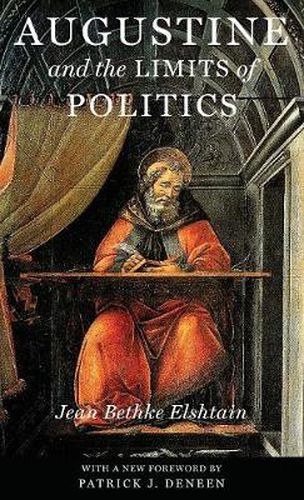Readings Newsletter
Become a Readings Member to make your shopping experience even easier.
Sign in or sign up for free!
You’re not far away from qualifying for FREE standard shipping within Australia
You’ve qualified for FREE standard shipping within Australia
The cart is loading…






This title is printed to order. This book may have been self-published. If so, we cannot guarantee the quality of the content. In the main most books will have gone through the editing process however some may not. We therefore suggest that you be aware of this before ordering this book. If in doubt check either the author or publisher’s details as we are unable to accept any returns unless they are faulty. Please contact us if you have any questions.
Now with a new foreword by Patrick J. Deneen.
Jean Bethke Elshtain brings Augustine’s thought into the contemporary political arena and presents an Augustine who created a complex moral map that offers space for loyalty, love, and care, as well as a chastened form of civic virtue. The result is a controversial book about one of the world’s greatest and most complex thinkers whose thought continues to haunt all of Western political philosophy. What is our business within this common mortal life? Augustine asks and bids us to ask ourselves. What can Augustine possibly have to say about the conditions that characterize our contemporary society and appear to put democracy in crisis? Who is Augustine for us now and what do his words have to do with political theory? These are the underlying questions that animate Jean Bethke Elshtain’s fascinating engagement with the thought and work of Augustine, the ancient thinker who gave no political theory per se and refused to offer up a positive utopia. In exploring the questions, Why Augustine, why now?
Elshtain argues that Augustine’s great works display a canny and scrupulous attunement to the here and now and the very real limits therein. She discusses other aspects of Augustine’s thought as well, including his insistence that no human city can be modeled on the heavenly city, and further elaborates on Hannah Arendt’s deep indebtedness to Augustine’s understanding of evil. Elshtain also presents Augustine’s arguments against the pridefulness of philosophy, thereby linking him to later currents in modern thought, including Wittgenstein and Freud.
$9.00 standard shipping within Australia
FREE standard shipping within Australia for orders over $100.00
Express & International shipping calculated at checkout
This title is printed to order. This book may have been self-published. If so, we cannot guarantee the quality of the content. In the main most books will have gone through the editing process however some may not. We therefore suggest that you be aware of this before ordering this book. If in doubt check either the author or publisher’s details as we are unable to accept any returns unless they are faulty. Please contact us if you have any questions.
Now with a new foreword by Patrick J. Deneen.
Jean Bethke Elshtain brings Augustine’s thought into the contemporary political arena and presents an Augustine who created a complex moral map that offers space for loyalty, love, and care, as well as a chastened form of civic virtue. The result is a controversial book about one of the world’s greatest and most complex thinkers whose thought continues to haunt all of Western political philosophy. What is our business within this common mortal life? Augustine asks and bids us to ask ourselves. What can Augustine possibly have to say about the conditions that characterize our contemporary society and appear to put democracy in crisis? Who is Augustine for us now and what do his words have to do with political theory? These are the underlying questions that animate Jean Bethke Elshtain’s fascinating engagement with the thought and work of Augustine, the ancient thinker who gave no political theory per se and refused to offer up a positive utopia. In exploring the questions, Why Augustine, why now?
Elshtain argues that Augustine’s great works display a canny and scrupulous attunement to the here and now and the very real limits therein. She discusses other aspects of Augustine’s thought as well, including his insistence that no human city can be modeled on the heavenly city, and further elaborates on Hannah Arendt’s deep indebtedness to Augustine’s understanding of evil. Elshtain also presents Augustine’s arguments against the pridefulness of philosophy, thereby linking him to later currents in modern thought, including Wittgenstein and Freud.